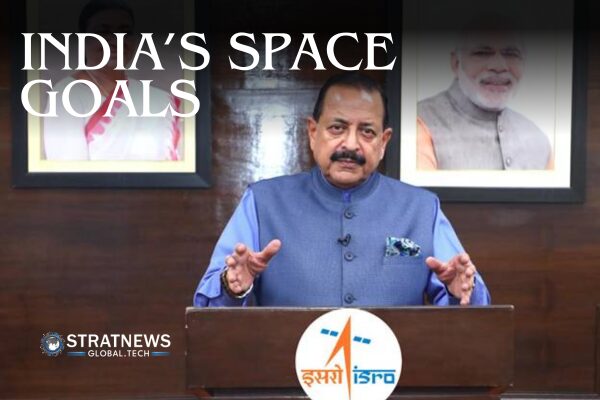India’s Space Vision for 2040: Aims for Moon Landing by 2040 and Space Station by 2035
India is accelerating its space ambitions with bold plans to build a Bharatiya Space Station by 2035 and send an Indian astronaut to the Moon by 2040. Speaking at the International Conference on Space 2025, Dr. Jitendra Singh, Union Minister of State for Science and Technology, highlighted these goals while underlining India’s commitment to global progress through space technology.
Addressing the conference virtually, Dr. Singh spoke on the theme “Harnessing Space for Global Progress: Innovation, Policy, and Growth.” He noted that recent milestones, such as the Chandrayaan-3 lunar landing near the Moon’s south pole, have placed India among top spacefaring nations.
Startup Ecosystem Fuelling Space Reforms
Dr. Singh emphasised the vital role of over 300 active space startups in India’s reform-driven space journey. These startups are engaged in areas like launch vehicles, satellites, and ground systems. Their work, he said, is sparking innovation, creating jobs, and attracting investments.
He credited the reforms initiated under Prime Minister Narendra Modi’s leadership for opening the space sector to private players, academia, and entrepreneurs. This inclusive approach is enabling a vibrant ecosystem that supports both new talent and established institutions.
Everyday Impact of Space Technology
The Minister stressed that the true power of space lies in its real-world applications. From agriculture and healthcare to education and urban planning, space technologies are making a meaningful difference in daily life. Dr. Singh pointed out that empowering citizens through space-based solutions is a key government priority.
He also praised India’s outreach programmes, such as ISRO’s collaboration with academic institutions and industry. These initiatives are developing skills in vital areas including satellite design, propulsion systems, AI, and space law.
Strengthening Global Cooperation
Dr. Singh highlighted India’s international space partnerships, including the joint NASA–ISRO NISAR mission with the US and the planned Chandrayaan-5 mission with Japan. Such collaborations, he said, show how space can be a platform for unity and innovation on a global scale.
The Minister welcomed the creation of the Confederation of Indian Industry’s National Committee on Space, saying it will help bridge the gap between traditional enterprises and emerging startups. He added that this platform can drive collective growth and support India’s leadership in the global space community.
The conference attracted more than 500 participants from India and abroad, including policymakers, scientists, business leaders, and entrepreneurs.
Dr. Singh concluded by reiterating India’s vision to use space as a tool for equity, sustainability, and progress. “Let us dream together, innovate together, and build together,” he urged, calling for unity in transforming space into a shared frontier for humanity.


